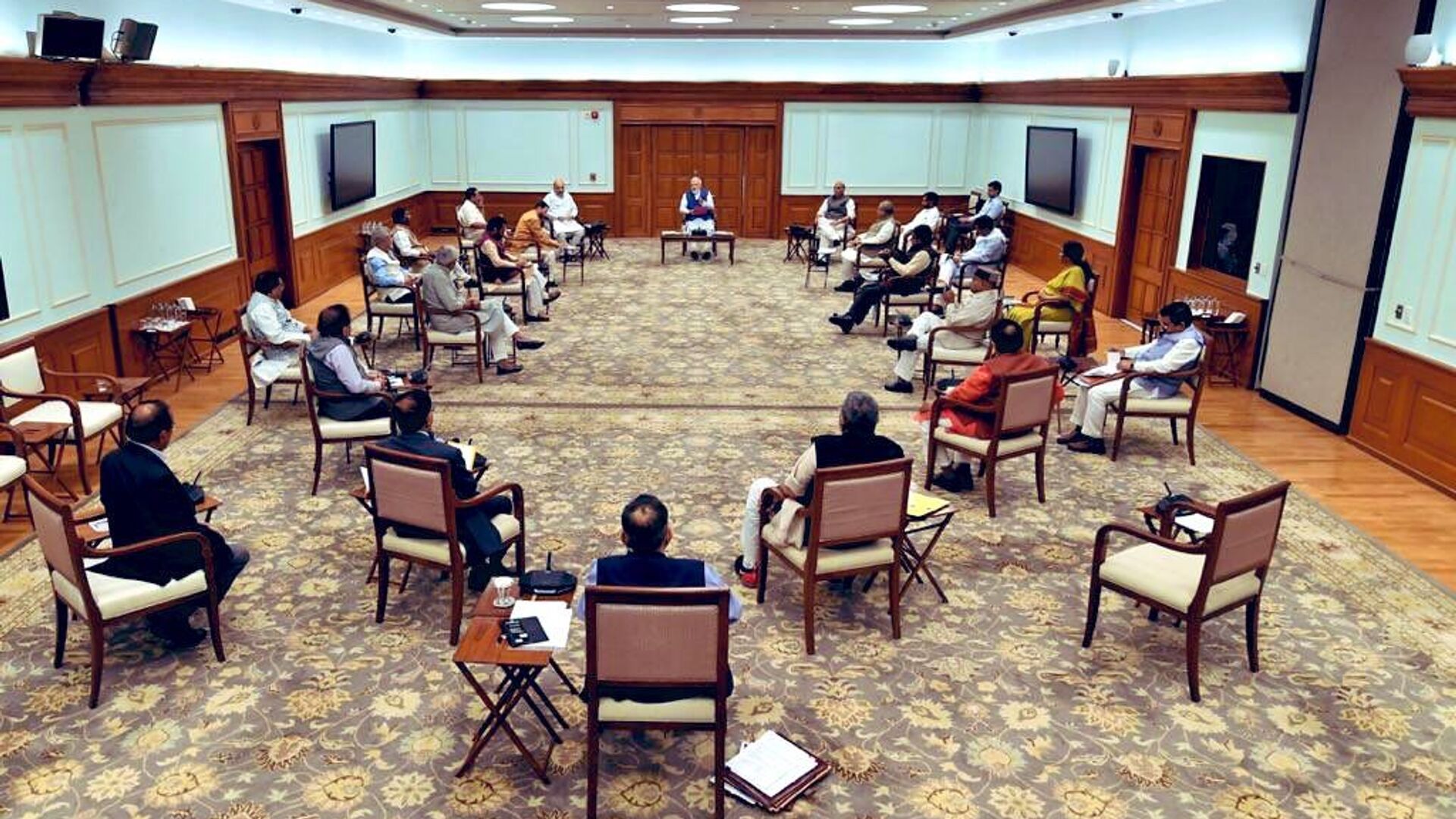https://sputnikglobe.com/20211215/india-clears-10bln-plan-to-attract-chip-makers-from-taiwan-as-us-china-rivalry-intensifies-1091543051.html
India Clears $10Bln Plan to Attract Chip-makers From Taiwan As US-China Rivalry Intensifies
India Clears $10Bln Plan to Attract Chip-makers From Taiwan As US-China Rivalry Intensifies
Sputnik International
Taiwan supplied 63 percent of the total global semiconductor market in the first two quarters of this year. Both China and the US are heavily dependent on... 15.12.2021, Sputnik International
2021-12-15T13:56+0000
2021-12-15T13:56+0000
2023-06-19T12:43+0000
narendra modi
china
supply chain
semiconductors
us-china trade war
chipmaker
taiwan semiconductor manufacturing company (tsmc)
us
taiwan
https://cdn1.img.sputnikglobe.com/img/107870/45/1078704576_0:39:1024:615_1920x0_80_0_0_05b5b82b3229f93b7559df75f5dd520c.jpg
The Indian cabinet, chaired by Prime Minister Narendra Modi, approved a comprehensive plan worth $10 billion on Wednesday, aiming to attract global manufacturers to set up semiconductor plants in the country. The Indian government will underwrite up to 50 percent of what it costs firms to set up a semiconductor plant.In addition, the government has announced up to $13 billion of production-linked incentives for related sectors such as advanced chemistry cell battery, auto components, telecom and networking products, solar PV modules, and white goods.Ashwini Vaishnaw, India's minister of IT and electronics, emphasised the importance of having a secure source of semiconductors in the present geo-political scenario with rivalry between the US and China developing over a range of issues, including the Taiwan Strait. Taiwanese firms are the primary source of semiconductors to the world, including China and the US.The development comes as the media reports the US is considering imposing stricter sanctions on China’s largest chip-maker, Shanghai-based Semiconductor Manufacturing International Corp.China, Japan, the European Union and the US are trying to curb their dependency on Taiwan for semiconductors by offering incentives for private businesses to increase the domestic supply with more units.Washington has urged Taiwanese firms to set up production units in the US, and Beijing has been encouraging their firms to increase manufacturing capacity.India at present imports almost all the semiconductors, with the demand growing at a pace of 15 percent annually. The US accounted for 12 percent of global semiconductor manufacturing, Semiconductor Industry Association data shows. The US Senate approved a $52 billion Bill to support domestic semiconductor manufacturing. Taiwan Semiconductor Manufacturing Company (TSMC), the world’s largest contract chip-maker, announced on 9 November that it will establish a subsidiary, Japan Advanced Semiconductor Manufacturing, in Kumamoto, Japan, to provide foundry services to answer strong global market demand for speciality technologies.
https://sputnikglobe.com/20211204/pentagon-chief-says-us-ready-to-support-taiwan-in-face-of-chinas-military-rise-1091251823.html
china
taiwan
Sputnik International
feedback@sputniknews.com
+74956456601
MIA „Rosiya Segodnya“
2021
Rishikesh Kumar
https://cdn1.img.sputnikglobe.com/img/07e4/08/04/1080055820_0:0:388:389_100x100_80_0_0_40018ee210946d65d49ffba4f4c008e1.jpg
Rishikesh Kumar
https://cdn1.img.sputnikglobe.com/img/07e4/08/04/1080055820_0:0:388:389_100x100_80_0_0_40018ee210946d65d49ffba4f4c008e1.jpg
News
en_EN
Sputnik International
feedback@sputniknews.com
+74956456601
MIA „Rosiya Segodnya“
Sputnik International
feedback@sputniknews.com
+74956456601
MIA „Rosiya Segodnya“
Rishikesh Kumar
https://cdn1.img.sputnikglobe.com/img/07e4/08/04/1080055820_0:0:388:389_100x100_80_0_0_40018ee210946d65d49ffba4f4c008e1.jpg
narendra modi, china, supply chain, semiconductors, us-china trade war, chipmaker, taiwan semiconductor manufacturing company (tsmc), us, taiwan
narendra modi, china, supply chain, semiconductors, us-china trade war, chipmaker, taiwan semiconductor manufacturing company (tsmc), us, taiwan
India Clears $10Bln Plan to Attract Chip-makers From Taiwan As US-China Rivalry Intensifies
13:56 GMT 15.12.2021 (Updated: 12:43 GMT 19.06.2023) Taiwan supplied 63 percent of the total global semiconductor market in the first two quarters of this year. Both China and the US are heavily dependent on Taiwan for chips in electronic goods, fighter jets, and other advanced products. India aims to attract investment from Taiwan as any confrontation between the US and China hampers supply.
The Indian cabinet, chaired by Prime Minister Narendra Modi, approved a comprehensive plan worth $10 billion on Wednesday, aiming to attract global manufacturers to
set up semiconductor plants in the country.
The Indian government will underwrite up to 50 percent of what it costs firms to set up a semiconductor plant.
“We expect investment of around $24 billion in the next five to six years in this sector that will generate direct employment for 130,000 engineers and designers. We estimate that the country will be able to produce semiconductors, display worth more than $110 billion, out of which $68 billion will be exported.”
Anurag Singh Thakur
India's Minister of Information and Broadcasting
In addition, the government has announced up to $13 billion of production-linked incentives for related sectors such as advanced chemistry cell battery, auto components, telecom and networking products, solar PV modules, and white goods.
Ashwini Vaishnaw, India's minister of IT and electronics, emphasised the importance of having a secure source of semiconductors in the present geo-political scenario with
rivalry between the US and China developing over a range of issues, including the Taiwan Strait.
Taiwanese firms are the primary source of semiconductors to the world, including China and the US.
“The approved programme will propel innovation and build domestic capacities to ensure the digital sovereignty of India,” Vaishnaw said after the cabinet briefing.
The development comes as the media reports the US is considering imposing stricter sanctions on China’s largest chip-maker, Shanghai-based Semiconductor Manufacturing International Corp.
China, Japan, the European Union and the US are trying to curb their dependency on Taiwan for semiconductors by offering incentives for private businesses to increase the domestic supply with more units.
Washington has urged Taiwanese firms to set up production units in the US, and Beijing has been encouraging their firms to increase manufacturing capacity.
“Almost all the major economies today are giving close to 50 percent capital incentive on setting up a semiconductor plant. We will be giving practically similar incentives. But what we are offering in advance is a very clear 20-year roadmap,” Vaishnaw said.

4 December 2021, 23:30 GMT
India at present imports almost all the semiconductors, with the demand growing at a pace of 15 percent annually.
The US accounted for 12 percent of global semiconductor manufacturing, Semiconductor Industry Association data shows. The US Senate approved a $52 billion Bill to support domestic semiconductor manufacturing.
Taiwan Semiconductor Manufacturing Company (TSMC), the world’s largest contract chip-maker, announced on 9 November that it will establish a subsidiary, Japan Advanced Semiconductor Manufacturing, in Kumamoto, Japan, to provide foundry services to answer strong global market demand for speciality technologies.






